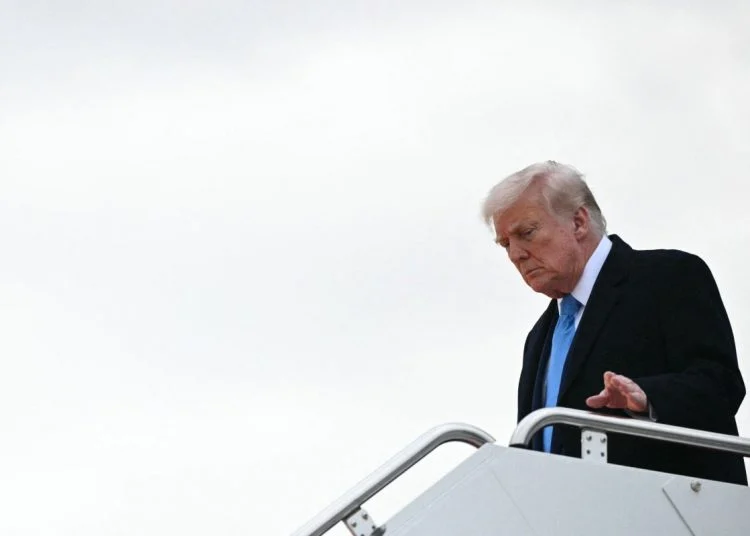
It took just 13 hours for the Trump government to give in to its reciprocal tariff scheme. President Donald Trump, Secretary of Commerce, Howard Lutnick, and commercial advisor Peter Navarro did exactly what they said they would not do: “retreat” non -negotiable trade measures. More disconcerting is that no significant commercial concession was obtained from a single country during the brief “maximum leverage” period. But a self -concutulatory tone was adopted after the announcement of a 90 -day break in reciprocal tariffs.
Although the president has been able to face retaliatory rates from foreign partners and disperse public demonstrations against Doge’s actions, he was unable to face the growing choir of CEOs that condemned his government’s tariff agenda. Under the threat of aggressive commercial tactics, US actions lost more than $ 6.5 trillion in two days. And more difficulties for the market seemed likely, as corporate quarterly profits were just beginning to be disclosed, with growth forecasts being revised down. In addition, the income from the Treasury titles and the value of the dollar seemed to be breaking with conventional trade standards for similar periods of crisis, feeding rumors that the two assets were losing their coveted “safe port” status – and threatening discounts on American corporate debt interest rates associated with this status.
Simply put, the CEOs were already fed up. JP Morgan CEO Jamie Dimon admitted that a recession is “a probable result,” as the tariffs were “beyond what people expected.” Delta Airlines CEO Ed Bastian removed the company’s financial forecast for the year “given the wide economic uncertainty around global trade.” Blackrock CEO Larry Fink told an audience at New York Economic Club that most business leaders in their portfolio companies “say we are probably in a recession now.” These three cases are just a few of the many recent challenges communications of all corporate community, including finance, transportation, housing, automobiles, technology and general manufacturing – led by other Tesla, Ford Jim Farley, Alcoa, as well as leaders of commercial associations such as Jay Timmons, the National Manufacturer Association, and leaders of the National Association of the National Association, from the National Association of Manufacturers, and and and the leaders of the National Manufacturer Association, and and and and Suzanne Clark of the US Chamber of Commerce.
Last month, at the meeting of CEOs de Yale, 100 of the main CEOs told us that they would begin to speak out against Trump if the stock market fell approximately 20%. Business executives did just that when markets surpassed or flirted with the limit. Collectively, they have neutralized threats and self -inflicted suffering in a president -aimed challenge.
Despite moderate commercial relief, CEOs remain confused and concerned about continuous delays and abrupt reversals from the government. Uncertainty paralyzed business investments and frustrated the potential opportunities for deregulation. Many expressed loss of confidence in the president’s economic policy agenda. Trump put himself in a precarious situation.
In the minds of corporate leaders, guilt is not only about Trump, but also about Navarro and Lutnick. Both lost credibility after reversing the course on tariff trading. In an interview last week at CNN, Lutnick said, “I don’t think there’s any chance … President Trump retreats into his tariffs.” On the same day, Navarro aired to declare that “this [doutrina tarifária] It is not a negotiation. ”The commercial consultant then reinforced the position in an opinion article for the Financial Times. He was Treasury Secretary Scott Bessent, who adopted the opposite message to his two colleagues in the internal dispute over the White House commercial strategy.
Market relief on Wednesday, in response to Trump’s publication on the Social Truth, indicates that the president may have soothed part of investors’ nervousness, but not CEOs. Business leaders may have prevented him from bringing the American economy on the edge of the abyss, but it continues to oscillating on the edge of the cliff.
The conflicting details of White House Secretary Karoline Leavitt, Bessent and Trump did not give business leaders confidence enough to end their break in capital investments or mergers and acquisitions. After firmer details behind the break came up, the initial excitement decreased. Some analysts even expect the new tariff policy to be so painful economically. The basic rate of 10% was not terminated. China rates were increased from 104% to 145% as retaliation punishment, although the European Union approved retaliatory tariffs hours earlier. The tariff posture over Canada and Mexico was not affected, nor the existing tariffs on the automotive, steel, aluminum, timber and others were terminated. Tariffs on the pharmaceutical and semiconductor industries are still being considered.
The increase in the sense of uncertainty that forced small companies to fall 50%, the conditions of the labor market to deteriorate, capital spending to stagnate and GDP growth forecasts to rinse still remains. Before any reciprocal tariff announcement, 89% of CEOs said in our CAUS CEO in March that they were increasingly concerned about the fact that the US economy was walking to a recession, while 69% said the government would be bad for the economy. Almost all leaders supported the use of selective tariffs, such as most of the American audience, but not those that are widespread or reciprocal. And as four fifths of CEOs reported having apologized for Trump’s behavior with his international colleagues, some of those long -standing foreign trade partners are having exploratory conversations with China to expand commercial ties.
Perhaps Musk has better described the current rates on X in the midst of his public fight with Navarro. Musk called Trump’s commercial counselor “dumbest than a brick bag.” It seems appropriate, but, on the other hand, this characterization may be unfair to the bricks.
Uncertainty in trade policy continues to represent significant challenges for business leaders, interrupting long -term planning, investment decisions and global supply chain strategies. The recent decision to suspend reciprocal tariffs may be a small “victory” for leaders. They expect the president to have learned a lesson.
Originally published by the team on 10/04/2025
By Jeffrey Sonnenfeld and Stephen Henriques
Source: https://www.ocafezinho.com/2025/04/10/como-os-ceos-derrotaram-trump-nas-tarifas/

